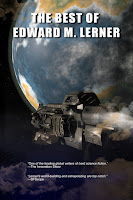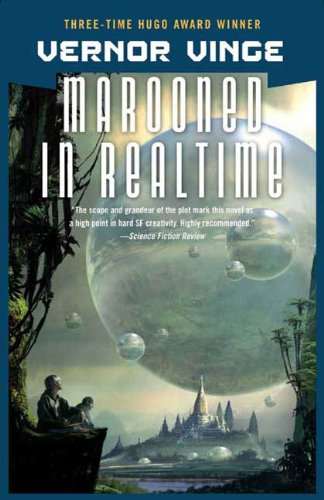Once again, I concede that a year's-best posting this early in November might seem, well, early. OTOH: lingering pandemic. Supply-chain woes. Labor shortages. Postal/UPS/FedEx slowdowns. Not to mention the countless stores that had up Christmas displays well before Halloween. Especially if you (or your reading giftees) prefer material in paper and ink, you may want to undertake your holiday shopping early rather than late. In any event, Black Friday and Cyber Monday will soon be upon us.
If you find none of that convincing? The way 2022 has been, surely
anything meriting the label "best" is welcome. Distraction via the books that follow certainly helped
me cope with this dreadful year.
Not to mention that if ever there were a year to support one's favorite authors, 2022 (again! sigh) is it. So: on to the latest installment of this annual feature.
As always, I read a
lot: as research, to keep current with the genre in which I write, and simply for enjoyment. Before the annual holiday shopping onslaught, I've taken to volunteering a few words about the most notable books from my reading (and sometimes re-reading) thus far in the current year. And a (very small) celebratory woohoo: this compilation is my tenth such post in the series.
When I name a book, you can be certain I really enjoyed it and/or found it very useful. Life's too short to gripe about books I didn't find notable (much less the several I elected not to finish). Presuming that you visit SF and Nonsense because you appreciate my assessment of things, you might find, in what follows, books you (and like-minded friends, relatives, etc.) will also enjoy. Unless otherwise indicated, the dates shown are for original publication. Titles of recommendations are Amazon links, often to newer editions than the original publication (and to Kindle editions, where available).
This year's summary is unusual in one respect: I'm going to name
one book of my own. Because, when calling out standout materials, I could hardly fail to at least mention the career-spanning, carefully curated, SF collection published this year that is
The Best of Edward M. Lerner. What's impressed me so far this year? Read on ....
I reread some old SF favorites this year. A few of them held up amazingly well. As it happens, the very best of the revisited bunch were all by the same author.
Marooned in Realtime (1986), Vernor Vinge. A murder mystery unfolding across deep time, involving humanity's few Singularity survivors, amid the puzzle of who or what led to the Singularity.
Marooned is loosely book two in a series (the first being
The Peace War), but the two novels take place eons apart;
Marooned easily stands alone. (Both books in the two-book series were Hugo Award nominees;
Marooned won its year's Prometheus Award.)
A Fire Upon the Deep (1992), Vernor Vinge. Epic, galaxy-spanning, space opera that at the same time features a planet-bound adventure with truly amazing, semi-medieval (and very alien) aliens. Also, super-beings the study of whom is "applied theology." (A Hugo Award winner; also a Nebula, Locus,
and Campbell Award nominee.)
A Deepness in the Sky (1999), Vernor Vinge. More epic space opera, this time of a light-speed-bound nature. Picking up on the backstory of one character from
Fire, this novel offers a far earlier interstellar civilization -- with
other truly alien aliens. Consider it a prequel to
Fire if you wish, but the novels are entirely independent. (Hugo, Campbell,
and Prometheus Award winner; Nebula, Locus,
and Clarke Award nominee.)
(For completeness, I'll mention yet another Vinge novel: The Children of the Sky. This takes place a decade or so after A Fire Upon the Deep. I also reread Children, and enjoyed it a lot -- but not quite as much as the aforementioned.)
As for new SF, I'll give a shout-out to one novel:
Hot Moon (2022), Alan Smale. Loosely in the spirit of the Apple+ TV series
For All Mankind, this is an alternate history of the Space Race.
Hot Moon is set in 1979, with American vs. Russian hostilities on and around the Moon. Smale is a NASA astrophysicist, and he used NASA files extensively to craft his Apollo-vintage spacecraft, Russian spacecraft, space stations, and lunar bases. Great SF
and great alternate history.
(Hot Moon is billed as Book 1 of a series, but there is as yet no Book 2 and the story is self-contained.)
General Fiction
The Best of James Van Pelt (2022). Should this book even be listed in the general-fiction category? Placement was a hard call. I mainly knew Van Pelt's writing from his frequent appearances in that bastion of hard SF,
Analog -- but it turns out that his soft SF, fantasy, mysteries, and non-genre stories are every bit as good. ANYway ...
There's a canard that "Those who can, do. Those who can't, teach." (Oh, and my personal corollary: those who can't teach, consult.) As it happens, JVP was for many years a high-school English teacher -- and man, does he disprove that canard. (Except for the consultant part. Don't get me started. But that has nothing to do with Jim.) There are tons of great stories -- almost 700 pages-worth. Take your time and savor them. I am.
The Woman in the Library (2022), Sulari Gentill. A mystery writer whose main
character is a mystery writer enmeshed in her own personal mystery, carrying on parallel correspondence with an obsessed fan and beta reader. A multilayered, engrossing novel.
Nonfiction
Chicago's Great Fire: The Destruction and Resurrection of an Iconic American City (2020), Carl Smith. I grew up in Chicago, so I wasn't
unfamiliar with the fact of this event -- but reading this well-documented history was an eye-opener. Also, forget any doggerel you might have heard in years past about Mrs. O'Leary and her cow. From the Great Fire in 1871 to hosting the Columbian Exposition in 1893? What a comeback story!
Improbable Destinies: Fate, Chance, and the Future of Evolution (2017), Jonathan B. Losos. A fascinating look at modern thinking about evolution, with interesting insights into the phenomenon of
convergent evolution. That latter item addresses how some adaptations, body plans, etc. often arise independently -- such as the streamlining exhibited by fish, cetaceans, and ichthyosaurs. Also (tantalizing hint) this book was a research source for an upcoming novel of mine.
1493: Uncovering the New World Columbus Created (2011)
, Charles Mann. Last year, I extolled the virtues of Mann's
1491, about the world Columbus and successive expeditions from Europe encountered.
1493 is about the world that emerged from those encounters, impacting the Americas and Europe, to be sure, but also Africa and Asia. Globalization 1.0, if you will ....
This isn't your typical history book. Topics include: how vast amounts of New World silver exported by Spain drove inflation, upending economies around the globe. How unfamiliar diseases ravaged populations lacking immunities, whether Native Americans from smallpox or Europeans from malaria and yellow fever. How plants first domesticated in one area (like sugar cane, potatoes, sweet potatoes, corn/maize, and rubber trees) transformed other, often distant, regions. Ditto, invasive pests that sometimes devastated such crops (think: Irish potato famine). How massive migrations took place, including the slave trade and the vast numbers of Native Americans and Africans who escaped bondage to build sometimes long-lasting mini-states (e.g., deep into Amazonia). And much, much more.
I'll venture there's something in this list for most any adult literary taste.
 Most Wanted Particle: The Inside Story of the Hunt for the Higgs, the Heart of the Future of Physics (2015), Jon Butterworth. Butterworth was a member of the ATLAS team at CERN. In addition to fascinating background on the hunt itself, there's a lot about quantum chromodynamics (QCD), the basic science of quarks and the strong force; the Standard Model of particle physics; and what may come next in particle physics. It's all done without math (but plenty of intuitive Feynman diagrams).
Most Wanted Particle: The Inside Story of the Hunt for the Higgs, the Heart of the Future of Physics (2015), Jon Butterworth. Butterworth was a member of the ATLAS team at CERN. In addition to fascinating background on the hunt itself, there's a lot about quantum chromodynamics (QCD), the basic science of quarks and the strong force; the Standard Model of particle physics; and what may come next in particle physics. It's all done without math (but plenty of intuitive Feynman diagrams). 











































No comments:
Post a Comment